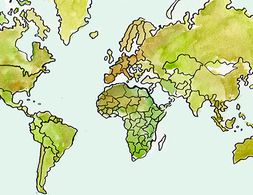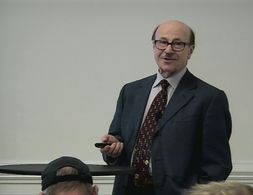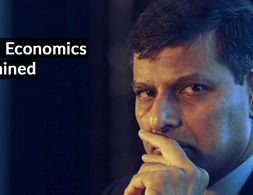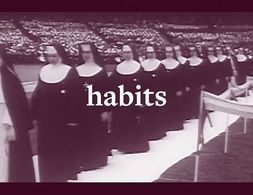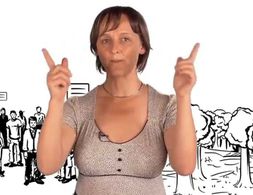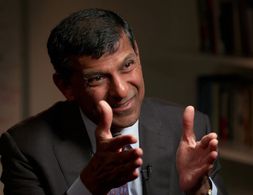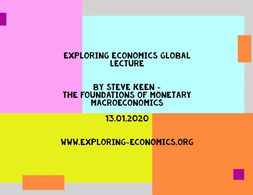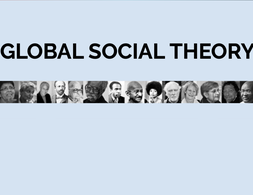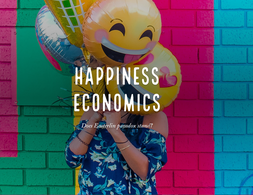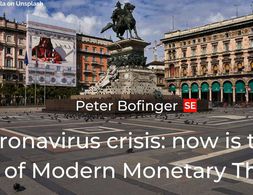✕
1136 results
Although sometimes used as synonyms, economic growth and economic development refer to different processes. While economic growth refers to an increase in real national income and output (i.e., GDP growth rate), economic development refers to an improvement in the quality of life and living standards (i.e., life expectancy).
What is game theory? Game theory is a way of thinking about strategic interactions between people, which makes it a crucial component of economics, political science, international relations, psychology and a variety of other disciplines that deal with the complexities of human interaction in decision making.
In this short video behavioural economist, Dan Aerily talks about how our cognitive illusions will trick us into believing something that is otherwise deemed irrational by the homo economicus. It raises and probes into some very interesting questions that defy the neoclassical rational behaviour.
This article investigates the set up of the CFA franc zones, its ties to French neocolonialism and its ability to further breed dependency in the former colonies.
In this article, Perry Mehrling, a professor of economics at Barnard College, presents and discusses three theories of banking which are guiding bank regulation. These are credit creation theory, fractional reserve theory and debt intermediation theory.
The main goal of this website is to make Economics less confusing. You can explore what the discipline of Economics is and could be. Learn about basic Economic terms and jargon.
In this talk, Eric Beinhocker outlines his ideas of how to ensure a just and sustainable future for Humanity: This includes his interesting Russian Doll approach to unpacking 20th-century economics and proposals of new theories to underpin a new economic system.
Donald Trump won in 2016 largely because enough voters in three states, all in the Rustbelt, which had voted for Barack Obama in both 2008 and 2012, switched their electoral votes from Democratic to Republican.
What data is used in the economic models of the IPCC? How problematic is it, that tipping points are often ignored? A very interesting presentation by Steve Keen during the OECD Conference "Averting Systemic Collapse".
A rethinking of the way to fight global poverty and winners of the Swedish Bank Prize for Economics.
In this short video 'Raghuram Rajan’s Dosa Economics Explained', the famous theory of Dr. Raghuram Rajan, ex-governor of Reserve Bank of India (RBI), Dosa Economics, has been explained using a very simple example of Dosa ( a delicacy of India). Here, Dr. Raghuram Rajan tries to explain that low interest rate and low inflation is much better than high interest rate and high inflation.
Professor Jennifer Clapp explains the dynamics of financialization of land and agricultural commodities in Subsaharan Africa. She points to the historical roots of accelerated land speculation and their connection to financial institutions, both generating and reinforcing the process of financialization of African land. Besides talking about roots and dynamics of speculation with land on financial markets, she puts the perspective of scholarly investigation onto the investor's side in discussing guidelines of responsible investment and regulation in the front instead of focussing on the receiving countries.
In this short video Peter Reich illustrates seven aspects of the state of the US economy. He provides suggestions on how to to get started to move towards a more fair distribution of wealth.
Ever wondered how a rap battle between John Maynard Keynes and F.A. Hayek would sound like?
Prof. Robert Guttmann looks at the current transformation of the international world order through the lenses of global money and finance.
In this talk Robert Skidelsky analyses how sociology did and could enrich economic analyses, but also how critical sociological insights have been colonised by mainstream economics.
In this short Video Silke Helfrich discusses the basics of commons. It’s an introduction into the essence of commons from a perspective stemming from outside the economic discipline that focuses on social practice. Her perception challenges the economic mainstream’s perception of common goods and goes beyond a purely materialistic conceptualisation of commons.
This content submission has two parts: (1) a link to the post by Wolf Richter on deterioration of US subprime credit card debt and loans, driven in part by the overuse of hedonic quality adjustments in the Consumer Price Index (CPI) used by the US Bureau of Labor Statistics, and (2) to introduce Exploring Economics to the website Naked Capitalism, which is an effort to promote critical thinking through the medium of a finance and economics blog and fearless commentary.
In this video, Rajan Raghuram highlights ‘A hereditary Meritocracy’. He identifies the “limitations” with the current economic systems of democracy and markets.
In this tenth lecture in INET’s “How and How Not to Do Economics,” Robert Skidelsky argues that there are two main reasons why economists should study history.
Mariana Mazzucato explains how we lost sight of what value means and why we need to rethink our current financial systems so capitalism can be steered toward a bold, innovative and sustainable future that works for all of us.
In this TED Talk, the behavioral economist Dan Ariely explain how changing our environment could change our behavior and how this connects with how we think about economics, through simple but powerful examples.
Planet Money and The Indicator aim to explain current economic events in an easy, fun and accessible manner.
As part of the 2019/2020 Exploring Economics Experience, one of our supporters Prof. Steve Keen gave a presentation to our editorial team. Read more
Inequality is an issue we all face every day, from income disparities to gender discrimination. In this first lecture in the Institute for New Economic Think...
Global Social Theory is a large wiki-like project by Gurminder K Bhambra. Its central aim is decolonising and diversifying universities, production of knowledge, and social thought in general.
It represents a large online library divided into three parts: concepts, thinkers, and topics in/of social theory and decolonial thought. Every part comprises of short, introductory articles on an according theme. It may be helpful to give you a general overview (and a list of basic readings) on the most essential areas of social theory: caste, class, and race; civil society; racism; secularism; feminism and many others.
It may also allow students whose university curriculum in sociology, economics, or other social sciences lacks diversity to compensate for that.
Prof. Yanis Varoufakis talks in this introductory lecture about the future of our economy and the current state of economics with special regard to pluralism in economics.
Happiness economics is a branch in behavioral economics, where it explores the economics factors and consequences of happy humans. What makes people happier, and what benefits do we get when people are happier? This dossier introduces you to the field of happiness economics, from a review of economic factors proposed to influence people’s happiness, to a discussion of the economic consequences of happiness, and concludes with economic policy implications of happiness economics.
The article discusses the state’s influence on innovation through financial support and provides examples how the state could receive a financial share of successful enterprises in order to keep on driving innovation in the future.
A stock-flow-fund ecological macroeconomic model
Overview page for the collection of nobel laureateas on Exploring Economics
Peter Bofinger argues that the Modern Monetary Theory gives theoretical justification for bold answers to the corona crisis.
We use cookies on our website. Click on Accept to help us to make Exploring Economics constantly better!




